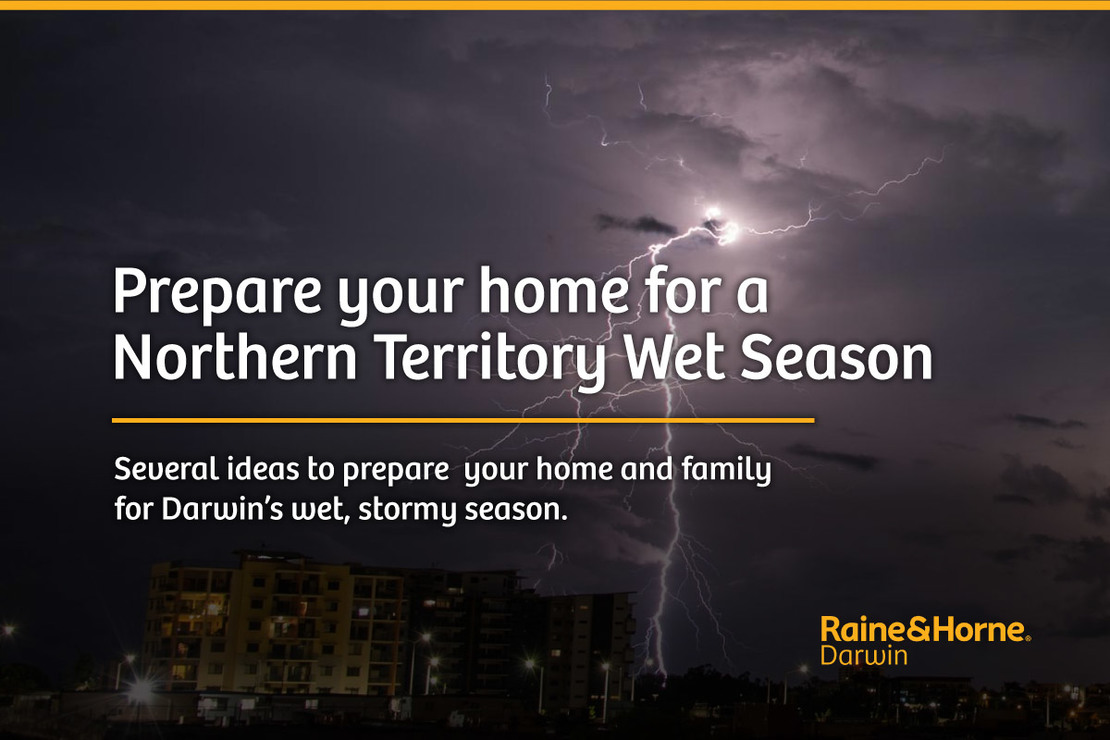- Home
- Blog
Darwin Blog

PREPARING YOUR HOME FOR A NORTHERN TERRITORY WET SEASON
With Darwin’s wet season fast approaching, now is the best time to start preparing for the wild weather of the Top End’s stormy, summer season. Here are several practical ideas to consider now while the weather is still mild to prepare for the heat, heavy rain, and storms. Most of these ideas you can do yourself, will help lower your utility bills, protect your investment, and prepare for the wet season in Darwin.
Check your aircon
Pretty soon you're going to need to crank up that aircon, (if you haven’t already), so it's best that you get it inspected and tuned up. Not only will it make a difference during the long steamy Build Up weeks ahead, but it also adds several years of life to your cooling system, and lower your electricity costs.
Every degree of heating or cooling can increase energy consumption by up to 10 per cent. Below are some tips to reduce your energy bill:
- Try running your air conditioner between 24°C and 27°C in summer and use your fan as well. A fan will take the humidity and edge out of the heat and circulate the colder air.
- Reduce your system's runtime. Try running a timer.
- Make sure your filters are clean. Clogged filters mean your system will use more power.
- Sleep under a sheet rather than a doona
- Ensure cool air cannot escape and close all windows and doors to rooms that do not need cooling. Close all curtains and drapes.
- Where possible, insulate ceilings, walls and window dressings. By doing this, you can reduce heat transfer in or out of the house.
- Place the air conditioner on the shady side of the building. Where possible, plant trees and shrubs around the building to create shade.
- Inverter air conditioners have lower running costs compared with standard air conditioners and they are quieter to run.
Clean and fix your gutters and downpipes
When gutters are clogged with leaf litter, palm fronds and twigs, water overflows and spills down, causing roof leaks and damage to walls. It is recommended that you clean the gutters before the wet season begins, and again after the first big rains to remove debris that washes down from the roof.
Fix any loose or sagging gutters and ensure that your downspouts carry water far away from the house.
Check your roof, skylights, and flashing
The roof is the most obvious entry point for rain. Leaks often occur at the flashing in valleys or where pipes penetrate the surface and can cause damage to walls and ceilings. It is recommended to seal these.
Trim trees and remove palm fronds.
We recommend that owners consider pruning and thinning large trees and plants around the house prior to heavy rains. When laden with rainwater, weak trees and plants can snap or become easily uprooted. If palm fronds have piled up around the house, it’s a good idea to do a tip run.
Check and update Cyclone / Emergency Kit
Cyclones can develop at any time during the Top End’s wet season. It’s a good idea to check and update your cyclone emergency kits now.
What you will need:
- A cloth face mask or multiple disposable masks, hand sanitiser and disinfectant wipes
- Enough water and non-perishable food for each member of your family for 3 days. Don’t forget your pet’s food.
- Medication, stored in a waterproof bag
- First aid kit stored in waterproof bag
- Insect repellent
- Toiletries including toilet paper
- Disinfectant
- Basic tool kit
- Torches & additional batteries
- Candles & matches
- Battery operated radio & additional batteries
- Esky – with ice
- Plastic cups, plates & utensils
- Plastic sheet or tarp with ropes
- Keep sensible clothing nearby - covered shoes, a sweater, jeans, wet weather gear
- Cash
Get in touch
Please give our Property Managers a call on (08) 8941 8941, if you would like to organise any or all of the above – we’re readily available for general chats about property maintenance or to help you obtain quotes.